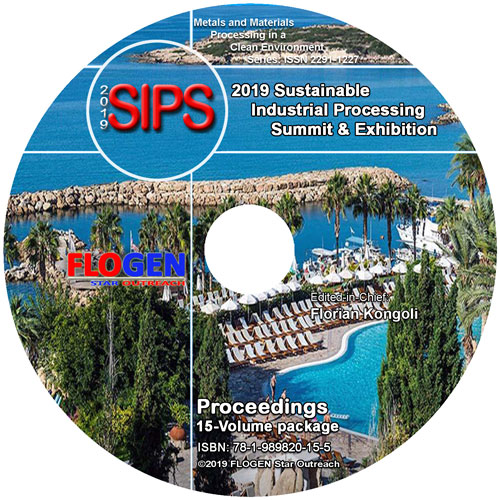2019-Sustainable Industrial Processing Summit
SIPS2019 Volume 4: Kozlov Intl. Symp. / Sustainable Materials Recycling Processes and Products
| Editors: | F. Kongoli, S.V. Alexandrovich, D.V. Grigorievich, L.L. Igoryevich, I. Startsev, T.A. Vladimirovich |
| Publisher: | Flogen Star OUTREACH |
| Publication date: | 20 December 2019 |
| Pages: | 193 pages |
| ISBN: | 978-1-989820-03-2 |
| ISSN: | 2291-1227 (Metals and Materials Processing in a Clean Environment Series) |

CD shopping page
Optimization of a Leaching Process for Pulverized Metal-Containing Residues
Eva Gerold1; Stefan Luidold2;1MONTANUNIVERSITAET LEOBEN, CHAIR OF NONFERROUS METALLURGY, Leoben, Austria; 2MONTANUNIVERSITAET LEOBEN, Leoben, Austria;
Type of Paper: Regular
Id Paper: 234
Topic: 7
Abstract:
The selective recovery of valuable metals from metal-containing residues not only conserves the primary resources, but also improves the availability of raw materials. First and foremost, the focus must be kept on previously unrecycled wastes as these have been removed from the circular resource flow.
The recycling of used batteries effects not only the treatment of hazardous waste, but also the recovery of valuable elements used in this field. On the commonly used pyrometallurgical route, mostly only the main metals are recovered. The application of hydrometallurgy remedies this problem and is mentioned in various research papers [1]. This process route gives the possibility of recycling for materials such as rare earths, cobalt and nickel which are often slagged in the pyrometallurgical process [2]. The recycling of metal-containing residues from the battery sector by hydrometallurgical means offers a wide range of possibilities. It is assumed that many different residues, as well as nickel-cadmium or nickel-metal hydride batteries and lithium-ion batteries can be recycled. Recycling processes for these metal-containing residues are divided in chemical processes (leaching, selective precipitation, solvent extraction) and mechanical and/or thermal processes [2,3].
The optimization of leaching parameters in the field of recycling of metal-containing residues represents a complex topic in the literature. In addition to the selection of an appropriate leaching medium, the variation of different leaching parameters such as temperature, time, solid-liquid ratio and concentration of the leaching medium have to be investigated in order to obtain the best possible result. Efficient leaching can only occur if there is an optimized process window with upper and lower limits for the respective parameters [4]. For experimental design and evaluation, a statistical software for design of experiments based on a fully factorial model serves for the interpretation of the process area [5].
Keywords:
Chemical; Electrolytes; Non-Ferrous; Oxides; Recycling; Thermodynamics; Waste;References:
[1] Ordonez, J., Gago, E. J., Girard, A. (2016). Processes and technologies for the recycling and recovery of spent lithium-ion batteries. Renewable and Sustainable Energy Reviews 60, 195-205.[2] Kaindl, M., Luidold, S., Poscher, A. (2012). Recycling von Seltene Erden aus Nickel-Metallhydrid-Akkumulatoren unter besonderer Beruecksichtigung von Saeurerueckgewinnung. Berg Huettenmaenn Monatsh 157/1, 20-26.
[3] Xu, J., Thomas, H. R., Francis, R. W., Lum, K. R., Wang, J., Liang, B. (2008). A review of processes and technologies for the recycling of lithium-ion secondary batteries. Journal of Power Sources 177/2, 512-527.
[4] Takacova, Z., Dzuro, V., Havlik, T. (2017). Cobalt precipitation from Leachate Originated from Leaching of Spent Li-ion Batteries Active Mass-Characterization of Inputs, Intermediates and Outputs. World of Metallurgy - ERZMETALL 70/6, 336-343.
[5] Mantuano, D. P., Dorella, G., Elias, R. C. A., Mansur, M. B. (2006). Analysis of a hydrometallurgical route to recover base metals from spent rechargeable batteries by liquida-liquid extraction with Cyanex 272. Journal of Power Sources 159/2, 1510-1518.